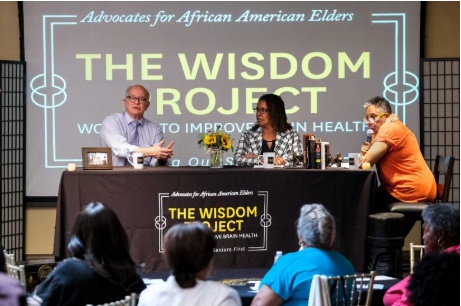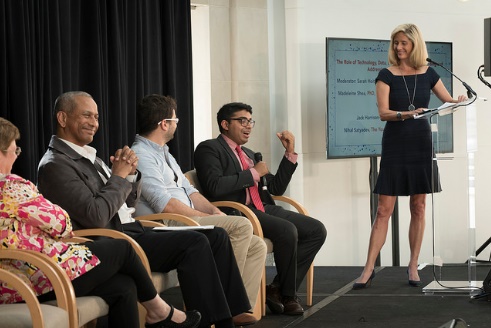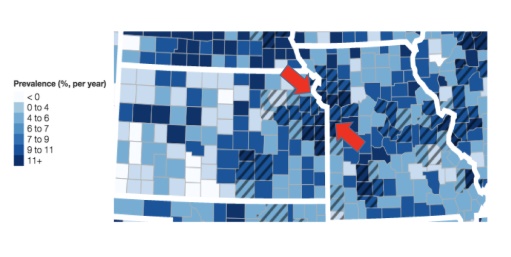Advances in technology and data analysis are shaping the ways we identify, treat, and understand public health challenges like Alzheimer’s, a progressive brain disease that erodes memory and thinking skills. As the sixth leading cause of death in America, Alzheimer’s is distablizing our healthcare system, economy, and local communities. Its remarkable cost, about $277 billion annually, is even limiting the ability of states to invest in early childhood education. This multifaceted healthcare crisis is ripe for disruption and UsAgainstAlzheimer’s is fostering a dialogue on the power of tech to do just that by leveraging big data, machine learning, and digital technologies to improve detection, upskill caregivers, and to increase public awareness. Below are a few of the key areas that hold promise in the race to cure Alzheimer’s.
AI: Powering the future of Alzheimer’s Diagnosis
Unlike diabetes, there is no simple test to diagnose Alzheimer’s disease so physicians have to consider a variety of complex factors to make a diagnosis. As a result, Alzheimer’s is often missed and goes undiagnosed, particularly in communities of color. Data science and artificial intelligence (AI) offers promising new ways to detect Alzheimer’s disease in patients who do not yet show obvious symptoms or whose signs of the disease are not yet readily detectable. For patients in the earliest stages of the disease, behavioral changes are often too subtle to be noticeable to the patient or to those around them.
For those at high risk for Alzheimer’s, those changes could be detected by new technologies that employ algorithms designed to identify subtle changes that could indicate the development of the disease. Devices installed with these algorithms can be placed in people’s homes to monitor sleep patterns and other potential indicators for Alzheimer’s. Through the CEO Initiative on Alzheimer’s, UsAgainstAlzheimer’s is partnering with Optum Labs to leverage machine learning to mine medical records to develop a predictive tool for Alzheimer’s, helping healthcare providers better understand who and when a person without Alzheimer’s symptoms is likely to develop them.
To fully realize the potential of AI in Alzheimer’s, we must ensure that the data sets feeding the underlying algorithms are representative of Latinos, African Americans, and other communities that face a higher risk of Alzheimer’s. Without this focus on equity, we run the risk of exacerbating already striking disparities in Alzheimer’s detection, treatment, and care.
AlzTalk: Bitmoji’s and Alzheimer’s?
While AI is shaping the future of Alzheimer’s diagnosis, simple everyday technologies like cell-phones and texting can offer us immediate ways to raise awareness of and provide education on the disease to at-risk communities. In our most recent AlzTalk, Karen Lincoln, PhD, Associate Professor in the USC Suzanne Dworak-Peck School of Social Work and Director of the USC Hartford Center of Excellence in Geriatric Social Work, discussed her research into how text messaging can be used to improve African Americans’ understanding of Alzheimer’s disease with Stephanie Monroe, Executive Director of AfricanAmericansAgainstAlzheimer’s.

Much of Dr. Lincoln’s research has focused on how to overcome mistrust of the healthcare system and increase the perceived value of clinical trials in black communities. In her recent pilot study, called BrainWorks, she has collected promising data showing that daily text messages can improve Alzheimer’s knowledge levels and change attitudes about clinical trials among people of color. You can listen to our conversation with Dr. Lincoln here as a podcast.
The Role of Technology, Data and Mapping in Understanding and Addressing Health Disparities
At our 2017 UsAgainstAlzheimer’s Disparities Symposium, a panel of experts working at the intersection of technology, public health, and health disparities explored the role of data and tech to visualize disparities and upskill caregivers. Sarah Hoit, CEO and Founder of Connected Living, an organization that uses technology to connect over 20,00 seniors to their families and friends, moderated the panel discussion.
The conversation included Vis Naidoo of Cell-Ed, a non-profit that leverages texting to upskill workers, who discussed how his organization is working to ensure that caregivers get the training they need to acquire basic skills that improve the quality and efficiency of the care they provide. As communities across the nation age, we have a moral and economic imperative to leverage tech to grow and increase the productivity of the care workforce. According to Jessica Rothenberg-Aalami, Founder and CEO of Cell-Ed, “Research shows that teaching workers over mobile devices is the most effective and fastest way to upskill them. And speed matters. Every minute a worker is unable to meet a patient’s care needs is another minute that patient suffers. Not acting with urgency around upskilling these workers all but guarantees that disparity of care for Latino patients will continue. That is unacceptable.”

Madeleine Shea, then Deputy Director of the Office of Minority Health at the Centers for Medicare and Medicaid Services (CMS), discussed the ways CMS uses data and mapping tools to address social health determinants and enhance health equity. CMS’ Mapping Medicare Disparities database helped UsAgainstAlzheimer’s target our education and outreach efforts in communities like Kansas City, MO. For example, CMS data shows that 9% of Latino Medicare beneficiaries in Johnson County have Alzheimer’s, which guided our partnership efforts in the great Kansas City community. And it works: targeted outreach in the region helped to boost Latino enrollment in local research by 700% in 2017.

The panel was rounded out by Nihal Satyadev of the The Youth Movement Against Alzheimer’s and Jack Harrison-Quintana of Grindr for Equality – both leaders in mobilizing young people through technology around public health challenges.
See the full panel discussion here:
As we develop data and tech focused-strategies to improve public health outcomes, we must keep equity and access top of mind. Our ability to harness technology to narrow disparities in healthcare could lead to healthier and more prosperous communities. Nowhere is this needed more than in the fight to stop Alzheimer’s.
Jason Resendez is the executive director of LatinosAgainstAlzheimer’s, a network of UsAgainstAlzheimer’s, and is passionate about addressing health disparities through data and tech. He is currently a Google NextGen Policy Fellow and member of AT&T’s Advisory Board on Access and Aging.
The opinions expressed in this article are those of the author and do not necessarily reflect those of the Diverse Elders Coalition.

